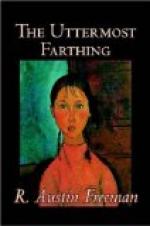“My progress through the squalid streets was quite triumphal. A large juvenile crowd attended me, with appropriate vocal music, and adults cheered from the pavements, though no one embarrassed me with gifts. But, for all my outward gaiety, I was secretly anxious. It was barely ten o’clock and many hours of the dreary November day had yet to run before it would be safe for me to approach my destination. The prospect of tramping the streets for some ten or twelve hours with this very conspicuous appendage was far from agreeable, to say nothing of the increasing risk of detection, and I looked forward to it with gloomy forebodings. If a suspicion arose, I could be traced with the greatest ease, and in any case I should be spent with fatigue before evening. Reflecting on these difficulties, I had decided to seek some retired spot where I could dismount the effigies, cover them with the tarpaulin that was rolled up in the barrow and take a rest, when once more circumstances befriended me.
“All through the night and morning the ordinary winter haze had hung over the town; but now, by reason of a change of wind, the haze began rapidly to thicken into a definite fog. I set down the barrow and watched with thankfulness the mass of opaque yellow vapor filling the street and blotting out the sky. As it thickened and the darkness closed in, the children strayed away and only one solitary loafer remained.
“’’Ard luck for you, mate, this ‘ere fog,’ he remarked, ’arter you’ve took all that trouble, too.’ (He little knew how much.) ’But it’s no go. You’d better git ‘ome whilst you can find yer way. This is goin’ to be a black ‘un.’
“I thanked him for his sympathy and moved on into the darkening vapor. Close to Spital Square I found a quiet corner where I quickly dismounted the guys, covered them with the tarpaulin and, urged by a new anxiety from the rapidly-growing density of the fog, groped my way into Norton Folgate. Here I moved forward as quickly as I dared, turned up Great Eastern Street and at length, to my great relief, came out into Old Street.
“It was none too soon. As I entered the well-known thoroughfare, the fog closed down into impenetrable obscurity. The world of visible objects was extinguished and replaced by a chaos of confused sounds. Even the end of my barrow faded away into spectral uncertainty, and the curb against which I kept my left wheel grinding looked thin and remote.
“Opportune as the fog was, it was not without its dangers; of which the most immediate was that I might lose my way. I set down the barrow, and, detaching the little compass that I always carry on my watch-guard, laid it on the tarpaulin. My course, as I knew, lay about west-southwest, and with the compass before me, I could not go far wrong. Indeed, its guidance was invaluable; without it I could never have found my way through those miles of intricate streets. When a stationary wagon or other obstruction sent me out into the road, it enabled me to pick up the curb again unerringly. It mapped out the corners of intersecting streets, it piloted me over the wide crossings of the City Road and Aldersgate Street, and kept me happily confident of my direction as I groped my way like a fogbound ship on an invisible sea.




